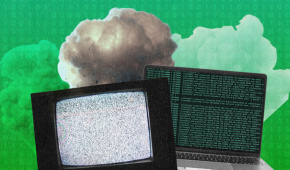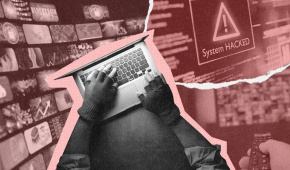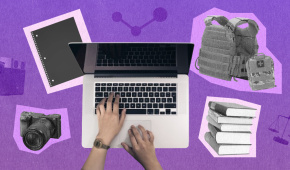Censorship of public opinion. How does cyberbullying of editorial offices affect mass media
87% of media professionals suffer from online bullying for their professional activities, according to an IMI study. According to the same study, 31% of cases of online bullying occured after the publication of journalistic stories. In its Freedom of Speech Barometer, IMI recorded cases of harassment of journalists and even injuries after physical assaults precisely because the attackers did not like the media where a journalist worked, regardless of his or her persona.
?Punishment by bullying
Most often, bullying of editorial offices occurs when they cover some high profile topics. The Hromadske editorial office claims that they usually face bullying, when writing about LGBT rights violations. They are accused of "leftism". In fact, "leftist" has already become a nickname, the haters are usedto call them. Hromadske claims that they speak impartially and objectively as a media outlet, and in Ukraine the rights of LGBT people are often violated, so they cannot ignore these topics.
Tetyana Kuznetsova Head of SM and communication for Hromadske says: “ Also, some people find it hard to believe that we are a truly independent media, so we are sometimes accused of having connections with various politicians and hate us for that. We take it with humor, so the words "worm", "left" have already become our favorite corporate meme. And yet it is regretful that notwithstanding all the open financial statements and transparent activities, there are still people who find it difficult to trust us. ”
The Kyiv bureau of Radio Svoboda says that cyberbullying against their media and journalists usually takes the form of insulting messages aimed at humiliating the authors of the material. However, in some cases there are online threats. The editors believe that among the motives may be a desire to shift the focus from the investigation of a particular policy to the identity of the authors.
"Thebullying may be revenge to attack the editorial office that published the information that the politician tried to hide. Sometimes bullying is used by real users of social networks, perhaps because it is an easy way to vent your own aggression or dissatisfaction. Moreover, the Internet allows you to remain anonymous at the same time, and thus avoid responsibility for what is said or written, ” commented Inna Kuznetsova, head of the Kyiv bureau of Radio Svoboda .
Serhiy Nikitenko, editor of the online publication MOST (Kherson), also considers unconstructive criticism as one of the elements of cyberbullying.
As an edition claiming to be the leader of the region not due to clicks, but due to quality and level of investigations and operational efficiency, it is very difficult for us to "assume" mistakes. Because it immediately intensifies against us the whole "enlightened" Facebook community and colleagues. It also looks like an element of bullying to me and personally upsets me a little. Recently, there was an incident with a source in the police who got us in wrongly with a report of the murder of local criminal authorities. The information turned out to be not true, we suffered reputational losses and came under devastating criticism from "colleagues". The only consolation is that most of those who were are themselves bright representatives of "journalism Ctrl + C, Ctrl + V".
Often due to prejudice against the media and its journalists, they can hate not only online, but also physically interfere. Oleksiy Bratushchak , a former-journalist for Channel 5, says that due to the channel's constant bullying by people with pro-Russian views and supporters of the Party of Regions, journalists were afraid to work in the Crimea.
According to Inna Kuznetsova, head of the Kyiv bureau of Radio Svoboda, she explains that journalists are often bullied not because bullyiers are dissatisfied with the quality of a particular journalist's work, but because that journalist works for the Radio Svoboda.
“Most trolls scold us not because they don't like a particular person, but because we work for Radio Liberty. Although their comments are allegedly addressed to a specific person, the presenter is not prepared, he looks bad, not so dressed and so on, ”explains Inna Kuznetsova .
“But when it comes to presenting alternative (to Russian propaganda) information about Crimea and Donbass, sometimes we have the impression of using special handouts, some topics are targeted with precise prepared in advance messages. There are trolls from one program to other are written with the same sentences, ”the head of the Kyiv Bureau of Radio Svoboda continues.
For example, TSN correspondent Dmytro Furdak live stand-up was disrupted by protesters in front of the Presidential Administration building during a rally in support of then-President of Ukraine Petro Poroshenko. One of the protesters "even punched the camera." The incident occurred due to the journalist's affiliation with TV channel 1 + 1 .
?Bullying by blocking
In the Ukrainian reality, cyberbullying can be considered as pressure on journalists by law (Part 2 of Article 171), but so far there is no case law on such cases. And it has some effects.
In 2017, the MOST website (Kherson) was “hacked” and several dozen publications related to criticism of certain individuals were taken down. In addition, all pages of the site were closed from indexing, and it disappeared from search engines for several months.
"We did not immediately realized what had happened, lost time and could not find evidence of a break-in. After that, we strengthened the security system as much as possible, and periodically change passwords and monitor security more closely, ”comments MOST editor Serhiy Nikitenko .
The editors of Hromadske say that on their Tik Tok page there were four cases of video blocking due to user complaints.
"On the anniversary of the Revolution of Dignity, we posted a video with archival footage of the Maydan, but it was blocked due to user complaints" about footage of cruelty and violence. " When we made a video about medical cannabis, it was also blocked due to complaints about "propaganda of excisable drugs", - explains Tetyana Kuznetsova Head of SM and communication Hromadske.
After such blockades, hits of other video media dropped significantly for a while.
If haters fail to block content or hack sites, they try to indirectly restrict content they don't like. Journalist Oleksiy Bratushchak says that his video about Shariy's party, which was registered not for the odious Anatoliy Shariy, but for the unknown Viktor Shariy, has got a huge disproportion of likes and dislikes on YouTube in favor of the latter. This happened after Anatoliy Shary's blog, where he publicly "criticized" this material.
Kyrylo Yevseyev , a YouTube channel promotion specialist, explains that every YouTube channel should strive for the number of likes to prevail over dislikes, as this situation will create a psychological picture for the audience and form a biased attitude towards the content before watching the video. And people who have posted an online will not see the video of this channel in the recommendations.
?Hidden consequences of bullying
Cyberbullying is often an act of public humiliation, so it causes subconscious fear and shame in those who are bullied. Often people try to go unnoticed so as not to attract the excessive attention of "trolls". And for a journalist, this can have catastrophic consequences.
"There is a bigger problem that independent media may face in the future. After all, now more and more editorial offices, in order not to be dependent on the media owner, create clubs of their supporters and stimulate crowd funding by readers. But this can be a problem when the editorial office is dependent on the opinion of its readers or patrons. If the story does not match the views or preferences of readers, and maybe donors, then the editorial office may lose supporters and certain amounts of money and get a hole in the budget. And in the conditions of independent financing from the oligarchs, there will be no financial capacity to reimburse it, which will lead to the dismissal or even closure of such media in the future, ”says journalist Oleksiy Bratushchak .
Revision " Ukrainska Pravda" even published a statement on cases Poroshenko and Sternenko demanding to stop the persecution of the edition.
It is clear from the UP's statement that the editorial office sees online bullying as an attempt to make pressure and try to influence their activities. “Any attempt to influence our work by politicians, activists, officials or business representatives (anyone) can be seen as pressure, and attempts to restrict our right to report the facts of society - as an attempt of censorship, " - said in a statement.
Sevgil Musayeva , the editor-in-chief of Ukrayinska Pravda, says that supporters of Petro Poroshenko and Serhiy Sternenko have had entire campaigns against the authors of the UP. According to haters, the media does not cover events objectively enough.
"Regarding the case of Pavel Sheremet, activists believe that we as an editorial board should take a position. Although we can't, because we are a party in court, and this obliges us not to disclose details and not to speak out, ” commented Sevgil Musayeva, the editor-in-chief of the UP .
By the way, the statement of the UP did not affect the cyberbullying of the editorial office, but the journalists considered it necessary to publish it.
Hromadske fears that cyberbullying may in the long run lead journalists to be reluctant to tackle complex topics. After all, cyberbullying greatly devalues the work of a particular journalist, demotivates and accelerates burnout.
“Fortunately, one of the values of Hromadske is courage. We spoke of such cases to joint editorial meetings and the feedbacks communication, continue to do our job and try to protect each other " , - convinced Tatiana Kuznetsova of SM and Head communication Hromadske.
? From the author
The requirements for journalists in Ukrainian society are quite strict. Media professionals have no right to make mistake, they must speak only the truth, and the truth will be different for each side of the conflict, they must correspond to the general trends and views of the majority and in no way raise unpopular topics that run counter to public opinion. In the journalistic community itself, it is not rule to be afraid or vulnerable. That is why media professionals are often left alone with daily and systematic insulting messages, humiliating comments, with their distorted photos from several years ago. They can only be attacked because they are journalists and represent everyone who works in the media. The insults targeting them are read by their relatives, they are worried and receive concomitant trauma. And the journalist must continue to be strong, regardless of the worries of relatives, nor to the indignation of "public opinion", because as soon as someone reveals his vulnerability, he will receive a new wave of hatred, which will remember all the previous "sins". Isn't it censorship?
Iryna Zemlyana, media expert and IMI security trainer
Help us be even more cool!



